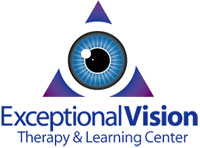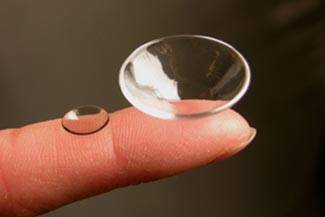
Corneal Collagen Cross-Linking for Keratoconus
Corneal collagen cross-linking (CXL) is currently the only treatment that may slow down the progression of keratoconus. This is a minimally invasive procedure to strengthen corneal tissue and stabilize the cornea’s shape.
If you have been diagnosed with keratoconus, or if you are concerned that your condition might be deteriorating, contact Dr. Lianne Pino at Exceptional Vision to evaluate whether CXL is the best option for you.
What Is Corneal Collagen Cross-Linking?
Corneal collagen cross-linking is a surgical procedure performed by a corneal specialist or ophthalmologist to stabilize the shape and firmness of the cornea. By applying riboflavin (vitamin B2) eye drops and ultraviolet light, the surgical treatment promotes the building of new collagen fiber links within the cornea. In many cases, it helps prevent the need for a corneal transplant.
Collagen plays a vital role in creating and maintaining the smooth round shape of the eye’s surface. The tightness of the woven collagen fibers determines the strength of the corneal tissue. A weak cornea is prone to deformation, causing keratoconus to progress.
CXL is also effective in treating corneal ulcers in cases where topical antibiotics did not produce results. Several other corneal infections have also successfully been treated with CXL.
Your Optometrist Prepares You for CXL
A few steps need to be taken before you undergo corneal collagen cross-linking. Dr. Lianne Pino can assess whether you are a candidate and get you ready for the surgical procedure.
1) We’ll Evaluate If You Need CXL
At Exceptional Vision, we will inquire into your patient history to determine whether any previous eye surgeries might prevent you from undergoing CXL. We will also examine several other factors, such as keratoconus progression and corneal thickness. In case you have dry eye, this needs to be treated appropriately before scheduling the CXL procedure.
2) Connecting You With The Right Surgeon
Following your eye exam and the evaluation of your suitability for CXL, we will connect you with an ophthalmologist to schedule the actual procedure. We at Exceptional Vision work with the finest corneal specialists in the area because we want you to be in good hands.
3) Pre-Op Exam With Your Optometrist
Just before the surgery, you will have a short pre-op examination at Exceptional Vision. Lens wearers are required to remove their contact lenses a few days prior to this examination so that measurements can be entirely accurate.
We will gather measurements about visual acuity, refraction, the shape of the corneal surface, and intraocular pressure. The data generated in this examination will be used for comparison in every future examination, and provide background for follow-up should the keratoconus continue to progress after the surgical intervention.
The CXL Procedure
 The ophthalmologist will first apply riboflavin eye drops (vitamin B2) to the surface of the eye. This substance is conducive to photo-enhancing; in other words, it improves light absorption. Next, the practitioner will expose the eye to a specific ultraviolet light to activate the development of new collagen cross-linking. This will cause the collagen fiber to thicken across the entire cornea and reinforce it.
The ophthalmologist will first apply riboflavin eye drops (vitamin B2) to the surface of the eye. This substance is conducive to photo-enhancing; in other words, it improves light absorption. Next, the practitioner will expose the eye to a specific ultraviolet light to activate the development of new collagen cross-linking. This will cause the collagen fiber to thicken across the entire cornea and reinforce it.
There are two types of corneal cross-linking procedures:
- Epithelium-on cross-linking or transepithelial cross-linking. In this procedure, the doctor applies the eye drops onto the outer layer of the cornea, called the epithelium.
- Epithelium-off cross-linking. To allow the riboflavin to penetrate more easily into the lower layers of the cornea, the doctor removes its outer layer before applying the drops. This surgical intervention has a slightly higher risk, as it could cause the disruption of surface cells in the epithelium.
We Provide Post-Op Care
The success of the one-hour surgical treatment depends as much on the quality of postoperative care as it does on the procedure itself. Careful management of eye health is essential for rapid rehabilitation of visual clarity and to reduce the risk of complications.
Follow-up care provided at Exceptional Vision includes three main objectives, of which the speedy healing of the corneal surface is primary. Generally, patients are prescribed temporary soft contact lenses to protect the eye surface during the healing process. The lenses also serve the purpose of minimizing potential pain.
To prevent infections, Dr. Lianne Pino will provide topical antibiotics and other medications that may be needed to protect the cornea and ensure a safe and fast recovery.
Who Can Undergo Corneal Collagen Cross-Linking?
The surgical treatment is recommended for patients who have recently been diagnosed with keratoconus and patients with a rapidly worsening condition. The sooner the treatment is applied, the better the chances of strengthening the cornea or even improving its shape.
Because CXL does not restore lost vision, early treatment is critical to prevent visual acuity from declining. This can also increase the chances of wearing traditional contact lenses later on.
Patients with stable keratoconus, a thin cornea, or a scarred cornea may not benefit from CXL and can potentially delay or avoid the procedure altogether.
Contact Dr. Lianne Pino at Exceptional Vision for additional information or to schedule an eye exam.
Our practice serves patients from Palmetto Bay, Miami, Cutler Bay, and Pinecrest, Florida and surrounding communities.Resources:
- https://www.allaboutvision.com/conditions/corneal-crosslinking.htm
- https://eyewiki.aao.org/Corneal_Collagen_Cross-Linking
- https://www.allaboutvision.com/conditions/keratoconus.htm
- https://www.nkcf.org/corneal-cross-linking-are-you-a-good-candidate/
- https://www.eyeworld.org/article-postoperative-management-of-corneal
- https://crstoday.com/articles/2017-jul/simplifying-the-preoperative-evaluation/












